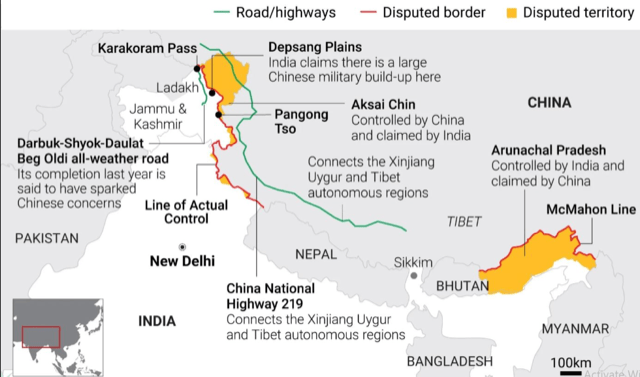UPSC Articles
Oct 28: China’s New Border Law – https://youtu.be/3rISEAk_10M
TOPIC:
- GS-2: India and its neighborhood- relations
- GS-3: Challenges in managing the borders
China’s New Border Law
Context: China has recently enacted a new law related to its border security management.
This comes amid
- A tense stand-off with India in the Himalayas, which sparked a deadly clash last year;
- Sporadic armed conflict between junta troops and ethnic armed groups in Myanmar, on China’s southwestern border
- Risks of terror spillover from a chaotic Afghanistan following US troop withdrawal and a Taliban takeover.
While terror spillover from Afghanistan or violence on the Myanmar border are concerns, the timing of the law suggests pressure on India is the aim.
China’s land borders
- China shares its 22,457-km land boundary with 14 countries including India, the third longest after the borders with Mongolia and Russia.
- Unlike the Indian border, however, China’s borders with these two countries are not disputed.
- The only other country with which China has disputed land borders is Bhutan (477 km).

The New Border Law
- The Land Border Law aims to standardise how China patrols its massive 22,100 km land boundaries and borders with 14 countries including India.
- Sets forth that China will handle border-related issues with neighbours through negotiations, to properly resolve disputes and long-standing issues.
- Chinese military should carry out border defence duties, management and control to prevent intrusions, infiltration and provocations.
- Infrastructure projects along the land border should be approved by the State Council and the Central Military Commission.
- The law was needed as there was no specific legislation for coordinating China’s border controls.
- This law was first proposed in March 2021 and will now come into effect by January 1, 2022.
India has expressed concern over this issue-
- China’s unilateral decision to bring about a legislation can have implication on existing bilateral arrangements on border management as well as on the boundary question.
- Such unilateral move will have no bearing on the arrangements that both sides have already reached earlier, whether it is on the Boundary Question or for maintaining peace and tranquillity along the LAC in India-China Border areas.
- India expects China will avoid undertaking action under the pretext of this law which could unilaterally alter the situation in the India-China border areas.














